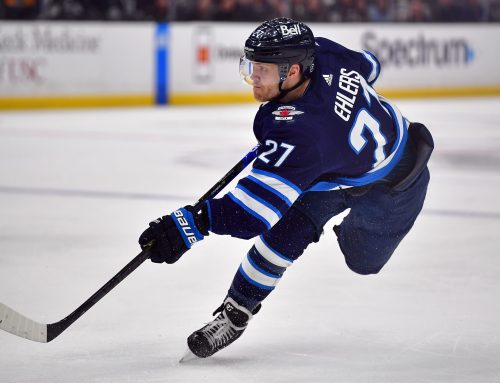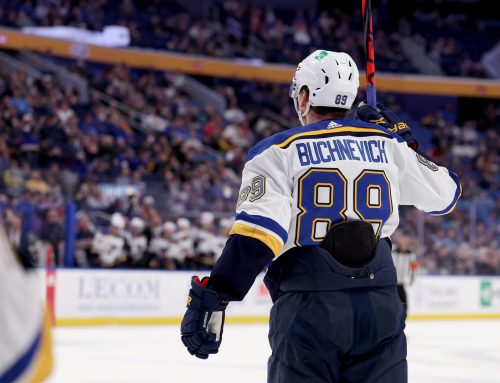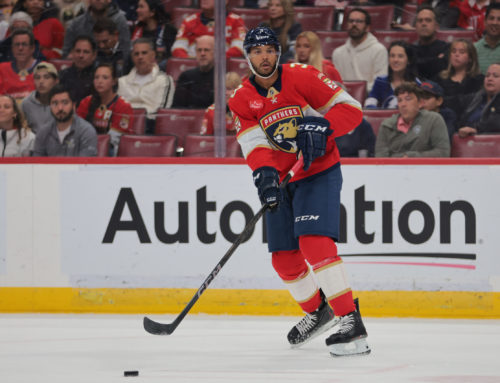If you haven't already, be sure to check out the latest The Journey by Dave Hall. This week, he takes a break from specific top prospects and discusses the pros and cons of several popular rumored ideas for the 2020 NHL draft. You should check out his column each week anyway for both draft-ready and NHL-ready prospects, which he will return to next week.
As I told Dave by email, I can see why the NHL would try to push holding a draft before the season resumes (follow the money, TV networks, exposure with very little competition, marketing opportunities, etc.) I simply don't like the idea for a number of reasons, unless the NHL decides sometime this month to stick a fork in the season. Then they can hold it as early as they want to.
Imagine the scenario of a team winning the draft lottery, then leapfrogging into a playoff spot, then winning the Stanley Cup. The odds of that happening would be remote, but it could happen. Then your Stanley Cup playoffs would lose major credibility when they are already being put into question by possibly being held with fewer games overall and/or shorter breaks between games.
*
You might prefer Joe Thornton with a beard, but this video is too top-notch not to share.
*
A couple of days ago, I discussed the top blocked-shot options among defensemen, which you can find here. Today, let's flip the Frozen Tools results over and look at the defensemen who block the fewest shots. Just so that we account for regular NHL defensemen instead of guys who only played a game or two all season, I'll look at the lowest blocked shots per 60 totals among defensemen. Here they are:
| Name | TOI | BkS/60 | BkS |
| QUINN HUGHES | 21:53 | 1.9 | 46 |
| JAKE GARDINER | 16:40 | 2.2 | 42 |
| ZACH WERENSKI | 23:59 | 2.3 | 58 |
| KEITH YANDLE | 19:42 | 2.3 | 51 |
| TOREY KRUG | 20:29 | 2.3 | 48 |
| JOSH MORRISSEY | 22:46 | 2.4 | 59 |
| CALE MAKAR | 21:01 | 2.4 | 47 |
| VINCE DUNN | 16:16 | 2.4 | 47 |
| CHAD RUHWEDEL | 14:46 | 2.5 | 25 |
| SHEA THEODORE | 22:14 | 2.6 | 69 |
| OLIVER EKMAN-LARSSON | 23:01 | 2.6 | 65 |
| ERIK GUSTAFSSON | 20:23 | 2.6 | 58 |
| TONY DEANGELO | 19:17 | 2.6 | 57 |
| BRAD HUNT | 15:08 | 2.6 | 39 |
| CAM FOWLER | 21:59 | 2.7 | 58 |
| RASMUS DAHLIN | 19:18 | 2.7 | 51 |
| COLIN MILLER | 17:08 | 2.7 | 40 |
| THOMAS CHABOT | 26:00 | 2.8 | 85 |
| JEFF PETRY | 23:39 | 2.8 | 79 |
| NEAL PIONK | 23:23 | 2.8 | 78 |
Hughes was profiled in the Friday Ramblings as having an extremely low hit total. So as much as he's an offensive machine in the making, this is a reminder that you shouldn't overvalue him in the leagues in which you need hits and blocked shots from defensemen. In fact, he was the only defenseman this season with a BkS/60 total of below 2.
This season, Hughes was often paired with Chris Tanev, who did that dirty work and turned out to be a top-5 option in the blocked shots category (and didn't miss extended time due to injury, as has been the case for the past few seasons). If your league is deep enough, adding a specialist like Tanev to counterbalance the pure offense of Hughes might not be a bad idea, whether they play on the same team next season or not (Tanev is about to become a UFA).
Here are three other offensive-minded defensemen who stood out as having low blocked shot totals.
Werenski's 58 blocked shots was his lowest total of his four-year career, yet he had also played the fewest number of games (63) over those four seasons. As is the case with many offensive-minded defensemen, Werenski's value dips in bangers leagues. He doesn't block too many shots, and he's not an overly physical defenseman. His career high in hits is 67, set last season. Also, he has never recorded more than 18 penalty minutes in a season, so you're adding him for his offense.
In spite of not reaching a career high in points this season (41 points), Werenski had his highest points-per-game output (0.65 PTS/G). Most notably, Werenski was the only defenseman to reach 20 goals this season. Oliver Bjorkstrand was the only Blue Jackets player who scored more goals (21). Werenski reached that total without taking 200 shots on goal (four defensemen reached that number), but he was on pace to reach that number. He may have been a bit lucky with the shooting percentage, as his 10.7% was also the highest of his career.
Werenski spent the final month of the season without his usual defense partner Seth Jones, who was out with a fractured ankle. Werenski's overall offense and power-play time remained largely unaffected during that time, but his overall icetime increased by about one minute to nearly 25 minutes per game.
Yandle's blocked shots total is his lowest of any full season since his rookie year, but if you know him well, he mainly brings the offense as well. Yandle also had 18 hits and 20 penalty minutes this season, which were also career lows since his rookie season of 2007-08.
Something that hasn't received enough attention, but might next season: Yandle's ironman streak. Yandle leads all current players with 866 consecutive games played and is only 98 games behind Doug Jarvis' record for consecutive games played. Never having to worry about whether Yandle will be in the lineup from game to game is a key advantage to owning him. You could say the lack of hits and blocked shots keep him healthy enough to add scoring to your lineup every game – he's the Phil Kessel of defensemen in that regard.
Yandle has reached the 40-point mark in each of his last seven seasons, with a significant portion of those points on the power play. Over that span (since the 2013-14 season), no defenseman has more power-play points (178) than Yandle. Unfortunately, he's not as strong in 5-on-5 play, which is reflected in his combined minus-69 over that span.
Yandle's total points mainly comes in the form of assists, as he has been a single-digit goal scorer since 2013-14. One area of concern is that his shot total this season (129 SOG) is down from previous seasons. That could be age-related, as Yandle is now 33 years old. As long as he's still playing games and on the first-unit power play, he shouldn't fall too far, though.
Krug's 48 blocked shots represented the lowest total of his seven full seasons, yet he had played in the fewest number of games in any season over that span. His 36 hits were also his lowest total over that span. As an undersized defender, Krug shouldn't be expected to play the physical game anyway.
Krug is a UFA after the season, so we will be discussing him again one way or another this summer. If recency bias means anything, he has helped his cause with 10 points (1g-9a) over his last nine games. Krug's 20+ power-play points over each of the last four seasons (including 28 this season) ties him with John Carlson for the most power-play points among defensemen over that span (107 PPP).
Much of his value will be tied to whether he will continue to be a PP1 option next season. Assuming he signs with the Bruins, there's no reason he should be moved off the first power play. You would think another team investing big bucks in him would also use him there, as those 28 power-play points this season led all defensemen. Krug keeper owners might prefer that he stay in Boston anyway, though. The Bruins' power play was ranked second in the league (25.2 PP%), so moving to a weaker power play could hurt Krug's numbers, even if he is on the PP1 for another team.
*
For more fantasy hockey information, or to reach out to me, you can follow me on Twitter @Ian_Gooding.





 FLA
FLA TOR
TOR CAR
CAR WPG
WPG DAL
DAL EDM
EDM BUF
BUF WSH
WSH OTT
OTT
